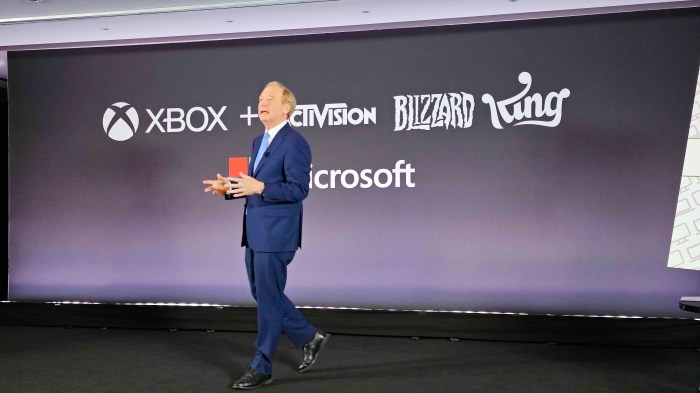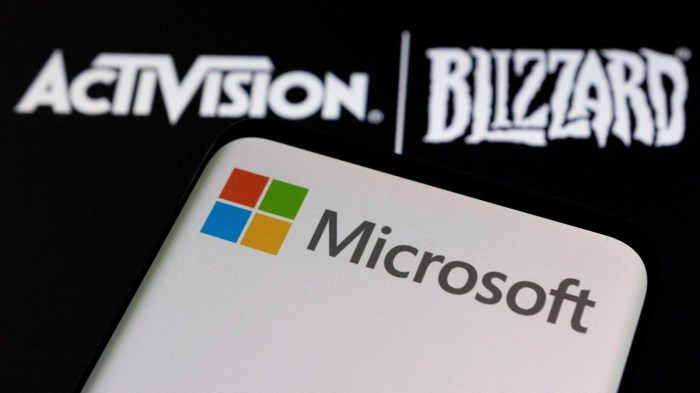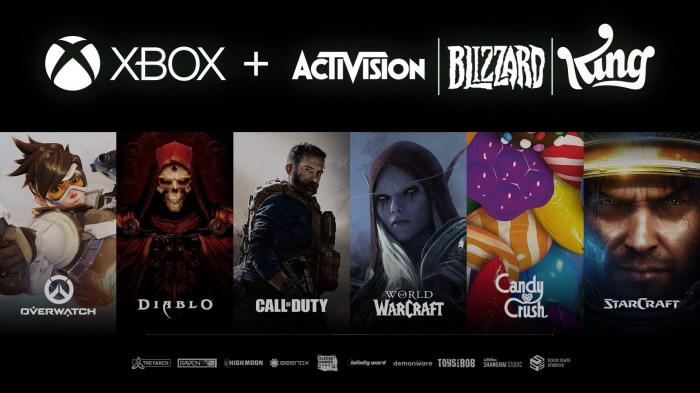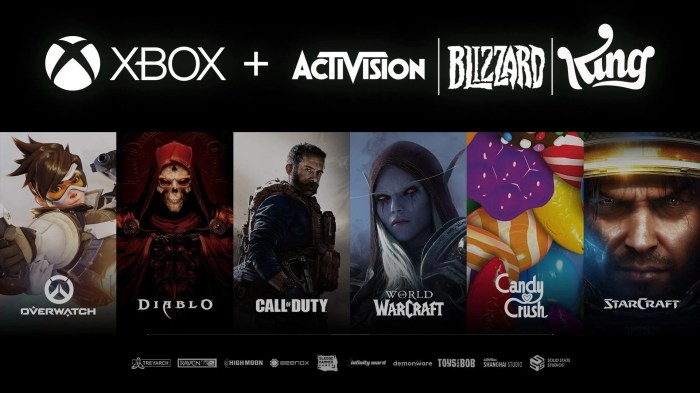Uk competition watchdog blocks microsofts acquisition activision – The UK competition watchdog blocks Microsoft’s acquisition of Activision Blizzard, a deal that would have made Microsoft the world’s third-largest gaming company. The Competition and Markets Authority (CMA) ruled that the acquisition would stifle competition in the cloud gaming market, potentially harming consumers.
This decision throws a wrench into Microsoft’s plans to expand its gaming empire, raising questions about the future of the gaming industry and the role of antitrust regulation in the tech sector.
The CMA’s decision is a significant blow to Microsoft, which has been aggressively pursuing acquisitions in the gaming industry in recent years. The company argued that the deal would benefit gamers by expanding access to Activision Blizzard’s popular games. However, the CMA determined that the acquisition would give Microsoft too much control over the cloud gaming market, potentially allowing it to raise prices or limit access to its games for rival services.
The Deal and its Implications: Uk Competition Watchdog Blocks Microsofts Acquisition Activision

In a move that sent shockwaves through the gaming industry, Microsoft announced its intention to acquire Activision Blizzard, the gaming giant behind popular franchises like Call of Duty, World of Warcraft, and Candy Crush, for a staggering $68.7 billion. This deal, if approved by regulators, would be the largest ever in the gaming industry and would cement Microsoft’s position as a dominant force in the global gaming landscape.
Rationale Behind the Acquisition
Microsoft’s acquisition of Activision Blizzard is driven by several strategic objectives. The company aims to expand its gaming portfolio, bolster its presence in the rapidly growing mobile gaming market, and enhance its subscription services, particularly Xbox Game Pass.
- Expanding Gaming Portfolio:Activision Blizzard boasts a diverse portfolio of popular game franchises, including Call of Duty, World of Warcraft, and Candy Crush. This acquisition would significantly expand Microsoft’s gaming portfolio, adding blockbuster titles and a loyal user base to its existing offerings.
- Mobile Gaming Expansion:Mobile gaming is a rapidly growing segment of the gaming industry, and Activision Blizzard’s King division, known for Candy Crush and other mobile games, provides Microsoft with a significant foothold in this lucrative market.
- Boosting Xbox Game Pass:Xbox Game Pass, Microsoft’s subscription service that offers access to a library of games for a monthly fee, is a key part of the company’s gaming strategy. By adding Activision Blizzard’s games to Game Pass, Microsoft can further increase the service’s value proposition and attract new subscribers.
Potential Consequences for Gamers
The acquisition of Activision Blizzard by Microsoft has the potential to significantly impact gamers in various ways.
Understand how the union of the mother of all typos can improve efficiency and productivity.
- Increased Game Availability:One of the most immediate benefits for gamers is the potential for increased availability of Activision Blizzard games. With Microsoft’s vast resources and distribution channels, gamers could see these titles become more accessible on different platforms and devices.
- Potential for Exclusive Content:However, the acquisition also raises concerns about the possibility of Activision Blizzard games becoming exclusive to Microsoft’s platforms, such as Xbox consoles and PC. This could limit the availability of these games to gamers who prefer other platforms, such as PlayStation or Nintendo Switch.
- Impact on Game Pass:The acquisition could also impact Xbox Game Pass. Microsoft could choose to make Activision Blizzard games exclusive to Game Pass, making it a more attractive option for gamers. However, it could also lead to a price increase for the service or a reduction in the number of other games offered.
Potential Consequences for Developers
The acquisition could have significant consequences for developers working at Activision Blizzard.
- Increased Resources and Support:Microsoft’s resources and support could benefit Activision Blizzard’s developers. This could translate into increased investment in game development, leading to more ambitious projects and innovative features.
- Potential for Culture Change:However, there are concerns about potential cultural changes within Activision Blizzard following the acquisition. Some developers may worry about Microsoft’s influence on the company’s creative freedom and development practices.
- Potential for Job Security:The acquisition could lead to job security concerns for some developers. While Microsoft has stated its commitment to retaining Activision Blizzard’s workforce, there is always a risk of redundancies or restructuring following a major acquisition.
Potential Consequences for the Gaming Landscape
The acquisition of Activision Blizzard by Microsoft could have a profound impact on the gaming landscape.
- Increased Competition:The deal could lead to increased competition in the gaming industry, as other companies strive to match Microsoft’s scale and reach. This could benefit gamers by driving innovation and fostering a more competitive market.
- Potential for Consolidation:However, the acquisition could also fuel further consolidation in the gaming industry, as other companies seek to acquire studios and franchises to stay competitive. This could lead to a decrease in diversity and innovation, as fewer companies control a larger share of the market.
- Impact on Subscription Services:The acquisition could further accelerate the growth of subscription services in the gaming industry. As more companies offer their games through subscription models, gamers could see a shift away from traditional game purchases.
The Competition Watchdog’s Concerns

The UK Competition and Markets Authority (CMA) made the unprecedented decision to block Microsoft’s acquisition of Activision Blizzard, citing concerns about the deal’s potential to stifle competition in the gaming market. This decision, announced in April 2023, highlights the CMA’s commitment to protecting consumer interests and ensuring a level playing field for businesses in the dynamic gaming industry.
The CMA’s Concerns About the Acquisition’s Impact on Competition
The CMA’s decision to block the acquisition was based on its comprehensive investigation into the deal’s potential impact on competition, particularly in the rapidly evolving cloud gaming sector. The CMA expressed deep concerns about Microsoft’s ability to leverage its control over Activision Blizzard’s popular franchises, such as Call of Duty, to gain an unfair advantage in the cloud gaming market and potentially harm consumers.
The CMA’s Assessment of Microsoft’s Potential to Stifle Competition
The CMA’s analysis focused on Microsoft’s potential to leverage its control over Activision Blizzard’s games to stifle competition in the cloud gaming sector. The CMA argued that Microsoft could use its control over these popular titles to:
- Degrade the quality of cloud gaming services offered by rivals:Microsoft could potentially restrict or degrade the quality of cloud gaming services offered by competitors by withholding access to popular games like Call of Duty. This could make it harder for rival cloud gaming services to attract subscribers and compete effectively.
- Increase prices for cloud gaming services:By controlling a significant portion of the market, Microsoft could potentially increase prices for its cloud gaming services, making them less accessible to consumers.
- Reduce innovation in the cloud gaming sector:Microsoft’s control over Activision Blizzard’s games could stifle innovation in the cloud gaming sector by discouraging competitors from investing in new technologies and services.
“The CMA’s decision to block the acquisition is a significant development in the gaming industry and underscores the importance of competition in ensuring a fair and dynamic market.”
Microsoft’s Response and Potential Alternatives

Microsoft expressed disappointment with the CMA’s decision, reiterating its belief that the acquisition would benefit gamers and the industry. The company emphasized its commitment to ensuring fair competition and stated its intention to appeal the decision. Microsoft highlighted its willingness to engage in further discussions with the CMA and explore potential solutions to address the regulator’s concerns.
Potential Alternatives for Microsoft
Microsoft has a few options to navigate the CMA’s decision. One strategy involves divesting certain assets or making concessions to address the CMA’s concerns. For instance, Microsoft could potentially sell off certain game franchises or studios to alleviate the CMA’s worries about market dominance.
Another alternative is to offer concessions to appease the CMA, such as providing access to Call of Duty on other platforms or offering more favorable licensing agreements to competitors.
Implications for Microsoft’s Gaming Strategy
The CMA’s decision presents significant implications for Microsoft’s future gaming strategy. The company’s plans to expand its gaming presence and compete with Sony and other industry players could be hampered by the blocked acquisition. This setback could prompt Microsoft to reassess its strategy, possibly leading to a shift towards alternative approaches for growth and market expansion.
The Broader Context of Antitrust Regulation
The CMA’s decision to block Microsoft’s acquisition of Activision Blizzard is a significant development in the ongoing debate about antitrust regulation in the tech sector. This decision highlights the growing scrutiny of tech giants and their mergers and acquisitions, particularly in industries like gaming where competition is crucial.
The CMA’s decision provides a valuable lens to examine the broader landscape of antitrust regulation in the technology sector and its potential impact on future mergers and acquisitions.
The Current Landscape of Antitrust Regulation in the Technology Sector
Antitrust regulation in the tech sector is a complex and evolving area, with regulators around the world grappling with the rapid pace of innovation and the increasing market dominance of tech giants. The traditional antitrust framework, designed for industries with more established structures, is being challenged by the unique characteristics of the digital economy.
The CMA’s decision underscores the growing trend of antitrust authorities scrutinizing tech mergers and acquisitions, particularly in industries like gaming, where the potential for market concentration and reduced competition is seen as particularly concerning.
Comparison with Similar Antitrust Cases in the Gaming Industry, Uk competition watchdog blocks microsofts acquisition activision
The CMA’s decision echoes similar antitrust concerns raised in other recent cases involving mergers and acquisitions in the gaming industry. For instance, the European Commission’s investigation into Nvidia’s acquisition of Arm Holdings, a chip design company crucial for the gaming industry, ultimately led to the deal being abandoned due to antitrust concerns.
These cases highlight the increasing willingness of antitrust authorities to intervene in mergers and acquisitions involving tech giants, particularly when there is a risk of stifling innovation and competition in the gaming sector.
The Potential Impact of the CMA’s Decision on Future Antitrust Enforcement
The CMA’s decision is likely to have a significant impact on future antitrust enforcement and regulation of mergers and acquisitions in the tech sector. This decision sets a precedent for stricter scrutiny of tech mergers, particularly in industries like gaming where the potential for market concentration and reduced competition is a concern.
The decision could also encourage other antitrust authorities to take a more aggressive stance towards tech giants, potentially leading to more stringent regulations and increased scrutiny of mergers and acquisitions.
The Future of the Gaming Industry
The CMA’s decision to block Microsoft’s acquisition of Activision Blizzard has significant implications for the future of the gaming industry. The ruling could set a precedent for future mergers and acquisitions in the sector, impacting the competitive landscape and the development and distribution of video games.
Potential Impact on Consolidation and Competition
The CMA’s decision reflects concerns about the potential for Microsoft to gain undue market power and stifle competition in the gaming industry. If Microsoft had been allowed to acquire Activision Blizzard, it would have become the world’s third-largest gaming company by revenue, behind only Tencent and Sony.
This would have given Microsoft significant control over popular game franchises like Call of Duty, World of Warcraft, and Candy Crush, potentially impacting competition in the console and PC gaming markets. The CMA’s decision could encourage other companies to explore acquisitions of gaming studios or platforms.
Potential for Other Acquisitions
The CMA’s decision could lead to a wave of mergers and acquisitions in the gaming industry as companies seek to expand their market share and compete with the likes of Microsoft, Sony, and Tencent. For example, companies like Electronic Arts, Take-Two Interactive, and Ubisoft could be potential targets for acquisitions, as they control popular game franchises and have significant market presence.
However, regulatory scrutiny of such deals is likely to increase in the wake of the Microsoft-Activision Blizzard case, making it more difficult for companies to successfully complete large acquisitions.
Long-Term Implications for the Development and Distribution of Video Games
The CMA’s decision could have long-term implications for the development and distribution of video games. It could lead to a more fragmented gaming market, with fewer dominant players and a greater diversity of platforms and games. This could benefit smaller developers and studios, who may have more opportunities to compete in a less concentrated market.
However, it could also lead to a more complex and fragmented gaming ecosystem, making it more difficult for players to access and play games across different platforms.





